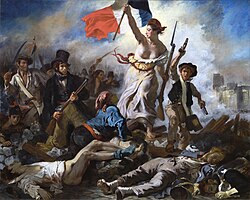
Back ثورة دائمة Arabic ثوره دايمة ARZ Permanent inqilab Azerbaijani Перманентная рэвалюцыя Byelorussian Revolució permanent Catalan Permanente Revolution German Permanenta revolucio Esperanto Revolución permanente Spanish Iraultza etengabea Basque انقلاب مداوم Persian
| Part of a series on |
| Trotskyism |
|---|
 |
| Part of a series on |
| Political revolution |
|---|
 |
|
|
Permanent revolution is the strategy of a revolutionary class pursuing its own interests independently and without compromise or alliance with opposing sections of society. As a term within Marxist theory, it was first coined by Karl Marx and Friedrich Engels as early as 1850. Since then different theorists, most notably Leon Trotsky (1879–1940), have used the phrase to refer to different concepts.
Trotsky's permanent revolution is an explanation of how socialist revolutions could occur in societies that have not achieved an advanced capitalist mode of production. Trotsky's theory also argues that the bourgeoisie in late-developing capitalist countries are incapable of developing the productive forces in such a manner as to achieve the sort of advanced capitalism which will fully develop an industrial proletariat; and that the proletariat can and must therefore seize social, economic and political power, leading an alliance with the peasantry. Trotsky also opposed Joseph Stalin's principle of socialism in one country and stated that socialist revolutions needed to happen across the world in order to combat the global capitalist hegemony. According to Russian historian Vadim Rogovin (1937–1998), the success of Stalin's theoretical position had a significant and negative impact on the entire course of the international revolutionary process.[1]
Marx's view of "permanent" revolution sees revolutionary activity as continuously ongoing until the revolutionary forces achieve a defined goal (such as socialism or communism).[2] This contrasts with the permanent (that is, ongoing forever) activity envisaged in Maoist Continuous Revolution Theory or in Tom Moylan's critical utopian discourse.
- ^ Rogovin, Vadim Zakharovich (2021) [1992]. Was There an Alternative? Trotskyism: a Look Back Through the Years. Mehring Books. p. 367. ISBN 978-1-893638-97-6.
- ^ Marx, Karl (March 1850). "Address of the Central Committee to the Communist League".
[...] it is our interest and our task to make the revolution permanent until all the more or less propertied classes have been driven from their ruling positions, until the proletariat has conquered state power and until the association of the proletarians has progressed sufficiently far – not only in one country but in all the leading countries of the world – that competition between the proletarians of these countries ceases and at least the decisive forces of production are concentrated in the hands of the workers.